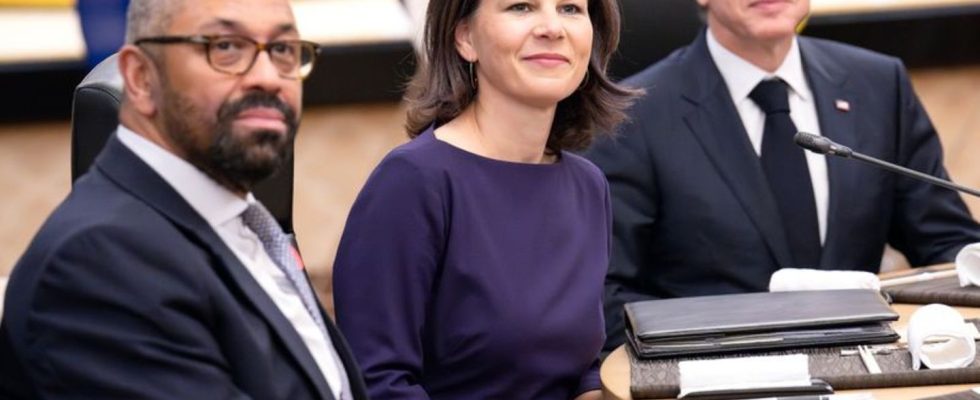G7 meeting
Baerbock: Humanitarian ceasefires remove breeding grounds for terror
G7 meeting in Tokyo: Federal Foreign Minister Annalena Baerbock between her counterparts James Cleverly (l, Great Britain) and Antony J. Blinken (USA). photo
© Sina Schuldt/dpa
G7 host Japan actually wanted to focus on the situation in the Indo-Pacific and economic cooperation. But two wars require the full attention of Baerbock and her colleagues.
That’s why it’s “so essential that humanitarian aid gets into Gaza so that the people there can be cared for so that it doesn’t become a breeding ground for further terrorism,” said the Federal Foreign Minister. The people needed water, bread and, above all, medical care. “And the most seriously injured must finally be treated.” In the evening, the situation in the Middle East was the topic of the first working lunch at the start of the G7 meeting.
In addition to Germany, the G7 countries also include France, Italy, Japan, Canada, the USA and Great Britain.
Dozens more Germans left Gaza
In the current situation, the departure of more Germans is “a small glimmer of hope,” said Baerbock. According to their information, more than 30 Germans have once again left the Gaza Strip. In total, more than 50 German citizens have now left the area. According to information from the Foreign Office, the Germans left on Monday evening.
Baerbock emphasized that the G7 would also discuss a future political solution – even if it “seems so incredibly far away these days.” It’s about how Palestinians and Israelis can live together in peace and security and how a two-state solution can be prepared for this. “This is also something that seems to be in the distance, but something we have to prepare for together,” said the Federal Foreign Minister.
Baerbock wants to campaign for more money for the UN Palestinian relief organization
The Foreign Minister said upon departure that the G7 countries ensured around two thirds of the financing of the UN Palestinian relief agency UNRWA. “We will encourage other financially strong donors to become more involved in UNRWA.”
Behind closed doors it could also be about the different voting behavior of the G7 members in the UN General Assembly on October 27th. A Jordanian resolution to improve the humanitarian situation and for an immediate ceasefire in the Gaza Strip received the necessary two-thirds majority. The USA voted against the paper, France for it. Germany abstained.
On Wednesday the topics are Ukraine and the Indo-Pacific
At the working sessions on Wednesday, the Russian war of aggression against Ukraine will be discussed again. In addition, against the background of China’s increasingly aggressive behavior, it will be about the situation in the Indo-Pacific. According to a spokeswoman for the Foreign Office in Berlin, Baerbock is also planning a conversation with the new Japanese Foreign Minister Yoko Kamikawa.
Baerbock: Continue comprehensive support for Ukraine
Baerbock warned: “If we now lose our breath in our support for Ukraine, (Russian President Vladimir) Putin will exploit this mercilessly – with terrible consequences for the people of Ukraine and Europe.” The G7 is currently coordinating its support for a “winter protection umbrella” for Ukraine. “It is also clear that, at this moment in time, some in the world are watching very closely how we continue to support Ukraine.”
Indo-Pacific: Preventing new theaters of war
With regard to the situation in the Indo-Pacific, Baerbock said that since Russia’s attack on Ukraine, we have “learned painfully how aggressive rhetoric or fantasy maps can become dangerous reality.” She did not explicitly mention China’s threats against the island state of Taiwan, but emphasized: “We must work together today to ensure that no new theaters of war arise whose shock waves would shake us all.”

